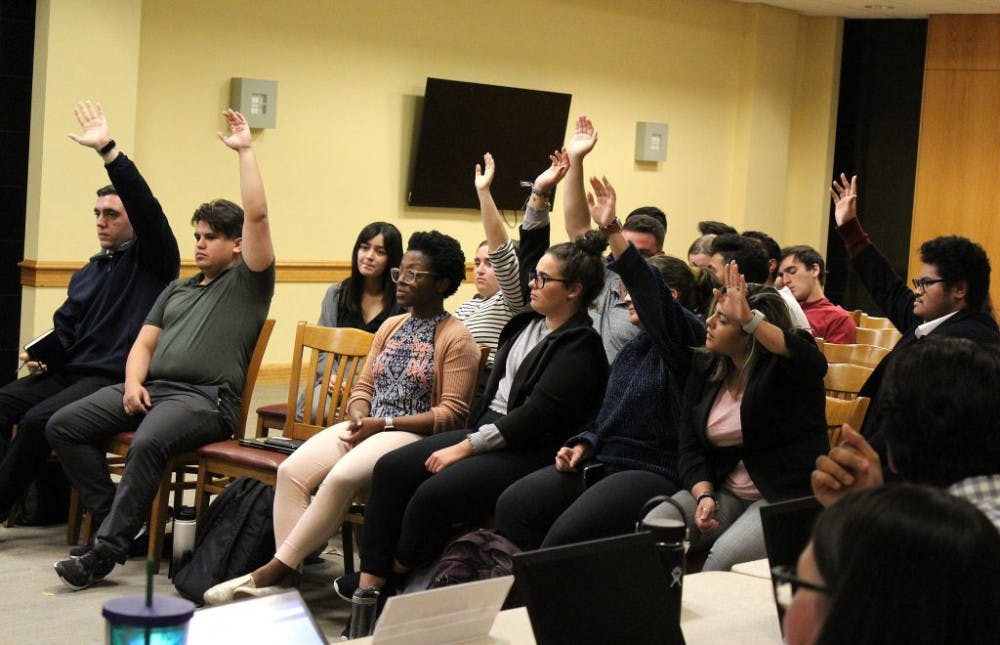After a series of debates, SGA votes to amend their agenda to recognize the native lands SHU was built on
The Student Government Association (SGA) passed their first bill of this legislative session on Monday night – an addition to their agenda to include the reading of a statement at every meeting recognizing the native peoples who occupied the land Seton Hall stands on, known as the Land Recognition Bill, following the invocation before each meeting.

The bill passed through a legislative process filled with two lively debates that centered around whether the land recognition statement should come before or after the invocation that takes place at the beginning of each meeting.
Senator Amber Ingram, the author of the bill, initially got the idea from the New Jersey Education Association (NJEA), where she sits on the board of directors and which has an agenda item similar to the one she proposed. Ingram’s bill includes a specific reference to the Lenape native people, who she claimed occupied much of the land the University stands on before being subsequently colonized.
When the bill was initially presented at the Oct. 7 SGA meeting for the first reading, some senators voiced reservations during the question period that the land recognition was placed before the invocation. Despite this, when the bill was presented in its final format Monday night the land recognition was still slated to come before the invocation if it passed, prompting Business Senator Ronald Babiak – a sponsor of the bill – to propose an amendment that switched the positions of the two orders of business to have the invocation come first which ultimately passed.
Some, such as Senator Taylor Newkirk disagreed with the move, though. During the first round of debate, Newkirk likened the land recognition with the African tradition of pouring libation to honor one’s ancestors. “When you think about a land recognition it’s like in a way a verbal pouring of libation for the people who came to this land beforehand,” she said, “so, in my mind I think it would be very nice and respectful to the people who owned this land before to recognize them before going into anything.”
After the first round of debate, Senator Alex Bloom proposed a motion to reamend the bill back to its initial format with the land recognition before the invocation, while Senator Ezequiel Meyers made a motion for the senate to begin voting on the bill in its amended format. Both motions ultimately failed, provoking the senate to vote to reenter debate around the issue of the placement of the land recognition and decide on how to proceed.
Ingram defended the initial iteration of her bill during the second round of debate, recalling the history of colonization in the Americas.
“Every place we go to in America if you’re not indigenous that land does not belong to you,” she said, “This land does not belong to Seton Hall. As an agent of Seton Hall, as SGA, this land does belong to us. That’s why I want to put the land recognition before the invocation. I understand the religious aspect but the reason why the land was taken was because of religious persecution, raping and pillaging.”
Senator Stefan Ferreira seemed to disagree with Ingram’s language, saying he “questions the purpose” of it given that they are there to represent over 5,000 undergraduate students.
“I’m hesitant to pass a bill that I think we need more reflection on – when that kind of language is used – because I’m kind of uncomfortable as to whether that truly represents my constituents as an at-large senator and me as a person,” Ferreira said.
Others, such as Senator Julia Nicolls, agreed with Ingram’s sentiments while disagreeing with her argument that the land recognition should come first, saying that Seton Hall’s Catholic tradition would prohibit her from voting for the bill if it was reamended to have the invocation come second.
“I’ve gone to Catholic school for a really big portion of my life and I, as myself, want land recognition to come as Item B [before the invocation],” Nicolls said, “but the fact of the matter is we go to a Catholic school. I want to be able to say that land recognition can go before invocation but because we are a Catholic institution and we willingly go to Seton Hall and sign onto being part of a Catholic school I think that invocation needs to come first under those guidelines.”
Following the debate, the Senate motioned to vote on the bill as is and ultimately passed it with the land recognition coming second to the invocation, failing to garner the vote of its author.
“I am not a fan,” Ingram said, “I definitely had a couple of conversations with my colleagues and it wasn’t a surprise that the amendment was going to be placed.” She added that she also had a conversation with herself, as well, as to whether or not she wanted it to pass with the land recognition second to the invocation, saying that the placement before the prayer had significant importance because the University’s namesake – St. Elizabeth Ann Seton – also had Native American heritage.
“I’m happy that it passed, but I’m just not happy that it’s after the invocation,” she said.
Ingram also identified herself as a “disruptor” and indicted that she will keep proposing legislation like the Land Recognition Bill, adding that she thinks SGA has been very safe in the things they’ve done in the past and she’s “tired of it.”
President Rishi Shah, who ultimately signed the legislation into law, commended Ingram’s bill.
“Although the Executive Board does not have direct influence on Senate decisions, I am extremely proud of Senator Ingram for her diligence regarding this matter. Senator Ingram did her due diligence and used outside influences to bring this change to the SGA.”
Nicholas Kerr can be reached at nicholas.kerr@student.shu.edu.
Judy Koren can be reached at judith.koren@student.shu.edu.





